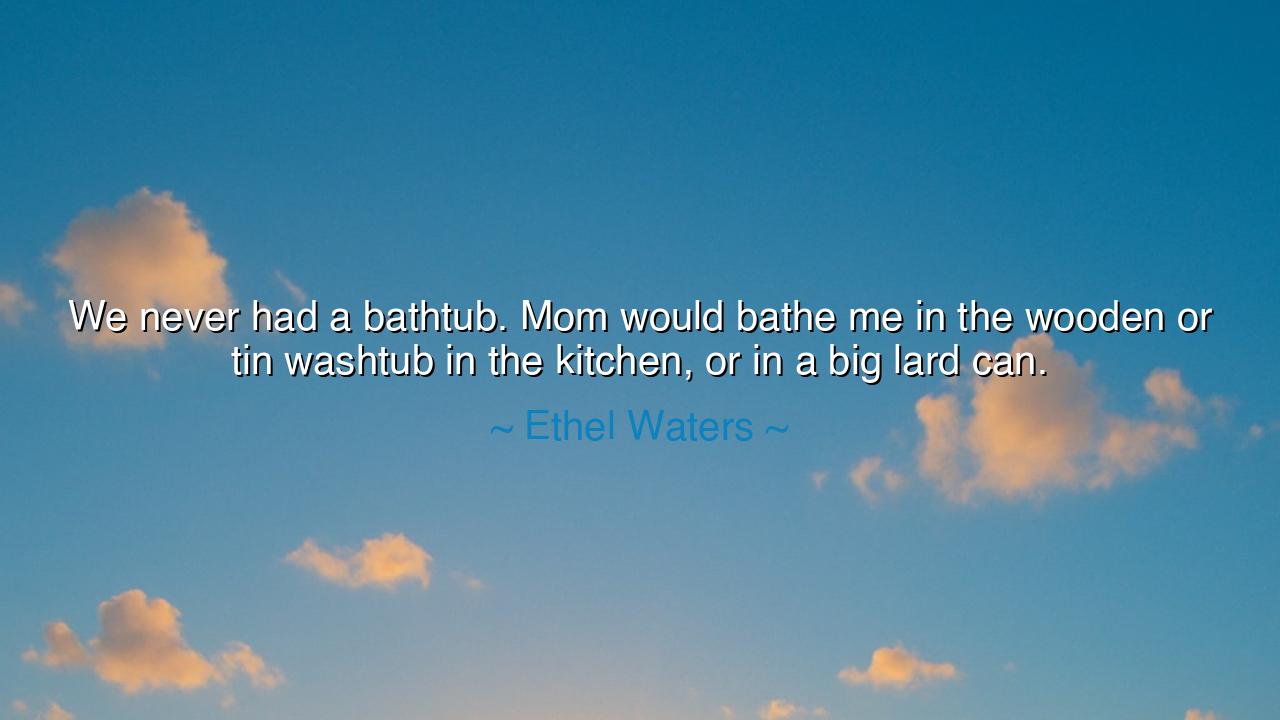
We never had a bathtub. Mom would bathe me in the wooden or tin
We never had a bathtub. Mom would bathe me in the wooden or tin washtub in the kitchen, or in a big lard can.






“We never had a bathtub. Mom would bathe me in the wooden or tin washtub in the kitchen, or in a big lard can.” — thus spoke Ethel Waters, and in these words we hear not only the memory of childhood, but the testimony of poverty, resilience, and the hidden dignity of the humble. What seems at first a picture of lack becomes, upon deeper reflection, a portrait of endurance and love. For though there was no bathtub, there was still care, there was still cleanliness, there was still the mother’s determination to nurture her child with what little she had.
The bathtub, symbol of comfort and privilege, was absent. In its place stood the washtub and the lard can—ordinary vessels, repurposed by necessity into instruments of nurture. The kitchen, the heart of the home, became the sacred space where survival was crafted, where a mother turned scarcity into provision. What society would call meager or unworthy became, through love, sufficient. This is the eternal truth: luxury is not required for dignity, nor abundance for care.
Consider the story of Diogenes the Cynic, who lived without riches, dwelling in a barrel, yet proclaimed himself freer than kings. His life demonstrated that dignity and worth are not measured by possessions but by the spirit with which one endures. In the same way, Waters’ mom, though denied the wealth of a proper bath, transformed the humblest tools into vessels of love. Her care was not diminished by poverty; it was magnified by her creativity and resolve.
The origin of Waters’ memory lies in the harsh realities of her childhood, marked by poverty in a time when opportunities were scarce, especially for single mothers and African American families. Yet her recollection is not bitter, but almost tender. To speak of the washtub and the lard can is to acknowledge hardship while also honoring the love that turned deprivation into survival. Her mother’s resourcefulness was itself a kind of quiet heroism, a declaration that even in want, her child would not be abandoned.
There is profound wisdom here: that the greatness of a life is not measured by what was absent, but by what was given despite the absence. The mom who bent over the washtub gave more than cleanliness—she gave resilience, she gave memory, she gave the foundation upon which Waters would later build her art and her voice. What seemed meager was, in truth, a rich inheritance of endurance.
The lesson for us is clear: do not despise small means or humble beginnings. The absence of luxury does not mean the absence of love. Indeed, it is often in scarcity that the truest strength of the human spirit is revealed. To endure with dignity, to repurpose what little you have, to transform hardship into care—these are the seeds from which greatness grows.
Practical action follows: look upon the ordinary tools of your life, the small spaces, the humble routines, and recognize their hidden sacredness. Honor the sacrifices of those who used so little to give you so much. And when faced with lack, do not despair—create, adapt, endure, as Waters’ mom did. For the true measure of life is not what vessel we are given, but what love we pour into it.
Thus Ethel Waters’ words live not as a lament, but as a hymn of resilience. The absence of the bathtub, the presence of the washtub in the kitchen, the memory of the lard can—all these become symbols of love’s creativity and poverty’s hidden power to forge strength. From such beginnings rose a voice that would one day be heard around the world. And so must we remember: greatness is often born not in abundance, but in the washtub and the lard can, sanctified by a mother’s hands.






AAdministratorAdministrator
Welcome, honored guests. Please leave a comment, we will respond soon